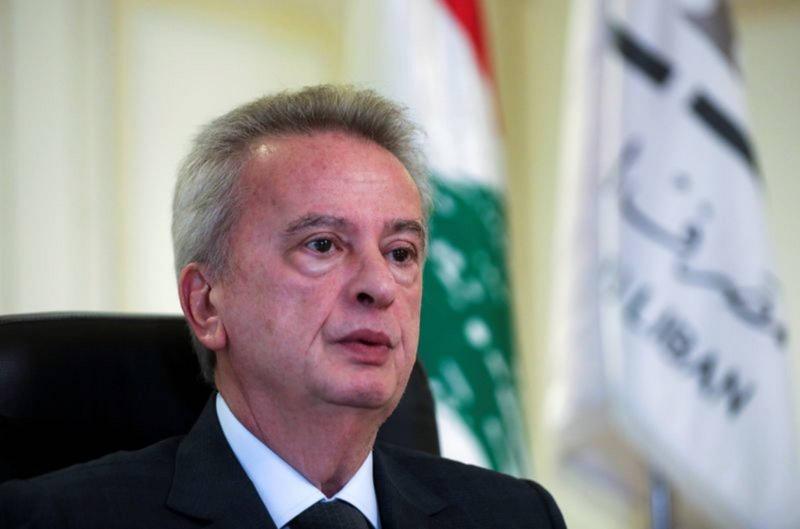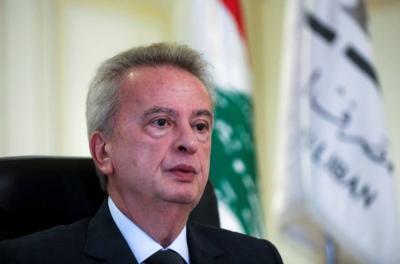The United States, Britain, and Canada announced on Thursday the imposition of sanctions on former Lebanese Central Bank Governor Riad Salameh, accusing him of committing acts of corruption to enrich himself and his associates. A notice published today on the U.S. Treasury's website indicated that "the United States has issued Lebanon-related sanctions targeting former central bank governor Riad Salameh, along with his brother Raja, his son Nadi, his assistant Marian Hawi, and his former partner Anna Kousakova." The U.S. Treasury stated that "Salameh’s corrupt and illegal actions contributed to the collapse of the rule of law in Lebanon," and sanctioned four others close to him, including relatives and partners who helped conceal and facilitate this corrupt activity.
The department added: "Salameh abused his position of power in a manner likely violating Lebanese law to enrich himself and his partners by transferring hundreds of millions of dollars through fictitious companies into investments in real estate in Europe." The U.S. State Department confirmed that the Lebanese Central Bank is not on the sanctions list and that the measures taken today specifically target Salameh and the other individuals mentioned.
Matthew Miller, a spokesperson for the State Department, mentioned, "We are fully aware of the pervasive corruption burdening Lebanon, and we remain committed to the Lebanese people while welcoming the opportunity to work with partners, allies, and members of Lebanese civil society and political elite dedicated to prioritizing their country’s interests over their personal agendas."
Brian Nelson, the Under Secretary for Terrorism and Financial Intelligence, stated, "By exploiting his position to enrich himself, his family, and his associates in clear violation of Lebanese law, Salameh contributed to the rampant corruption in Lebanon and set the perception that Lebanon's elites do not need to adhere to the same rules as all other Lebanese." He continued, "We join the UK and Canada in sanctioning the former governor because he used his position to place his financial interests above those of the people he served, even as the economic crisis in Lebanon worsened."
According to the U.S. Treasury, during recent years, international efforts to enhance corporate transparency have revealed Salameh's connections to numerous fictitious companies and bank accounts in Europe and the Caribbean. As the Governor of Lebanon's Central Bank, Salameh engaged in a variety of unlawful self-enrichment schemes with the assistance of close family members and associates. With the help of his brother Raja Salameh, he used a shell company, Forry Associates, owned by Raja in the British Virgin Islands, to transfer almost $330 million in transactions related to the Central Bank.
As part of this scheme, Salameh agreed to a contract allowing his brother’s company to receive a commission on financial instrument purchases by Lebanese retail banks from the Central Bank, despite Raja's company providing no clear benefit for these transactions, and the contract avoiding naming Forry Associates or its owner. Salameh and Raja then transferred these funds into bank accounts under their own names or those of other fictitious companies. Salameh's chief assistant at the Central Bank, Marian Hawi, joined Salameh and Raja in this scheme by transferring hundreds of millions of dollars—far exceeding her official salary at the Central Bank—from her bank account to Salameh and Raja’s accounts.
The Treasury statement continued, funds were frequently transferred to several property management companies in France, Germany, Luxembourg, and Belgium registered in the name of Salameh's son, Nadi, or his former partner, Anna Kousakova. Nadi was the registered general manager of companies in Luxembourg that used affiliates in Germany and Belgium to acquire high-value commercial properties worth tens of millions of dollars.
In France, Anna owned companies that received funds from Forry Associates and used this money to purchase luxury real estate, including apartments for herself and Salameh in one of Paris's most upscale neighborhoods and an office building on the Champs-Élysées that housed a rented office for the central bank. Salameh also employed shell companies in Panama and a trust fund in Luxembourg to conceal his identity while purchasing shares in a company where his son, Nadi, worked as an investment advisor, later selling those shares to a Lebanese bank under Central Bank supervision, representing a conflict of interest and a potential violation of Lebanese law prohibiting Central Bank employees from benefiting from other private businesses, enacted to ensure their full commitment to protecting Lebanon's economic prosperity.
The U.S. Treasury emphasized that as a result of these actions, all property and interests associated with these individuals within the United States must be blocked and reported to the Office of Foreign Assets Control (OFAC), stressing the Lebanese Central Bank and its assets are not considered blocked due to today’s actions.
Meanwhile, the British government added Riad Salameh to its global sanctions regime against corruption. Middle East Minister Lord Ahmad stated, "Riad Salameh and his close associates have stolen from the Lebanese people and deprived them of essential resources for economic and social stability... The UK is committed to the fight for justice and accountability for Lebanon and the Lebanese people. The only way to put Lebanon on the much-needed path to economic recovery is for its leaders to eradicate corruption and implement genuine reforms."
The Canadian Foreign Ministry announced that Canada imposed sanctions on three Lebanese individuals along with former Central Bank Governor Riad Salameh, his brother Raja, and his assistant Marian Hawi, in a coordinated effort with the U.S. and the UK targeting alleged corruption. Canadian Foreign Minister Mélanie Joly stated that on the third anniversary of the Beirut port explosion, Canada will impose sanctions under the Justice for Victims of Corrupt Foreign Officials Act (Magnitsky Act) in coordination with the U.S. and the UK, adding three Lebanese citizens to the list of justice for victims of corruption from foreign officials, and "these individuals have been listed due to their involvement in significant corruption, including embezzling public assets for personal gain and transferring the proceeds of corruption abroad. Such acts exemplify high-level corruption that has contributed to Lebanon's ongoing economic crisis."
Riad Salameh rejected the accusations against him in light of the new sanctions, vowing to challenge them. He denied the allegations from the three countries imposing sanctions in messages to Reuters, stating he would appeal them. He also noted that some of his assets had already been frozen in previous investigations.




